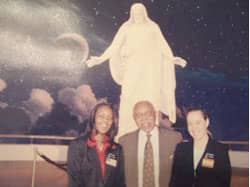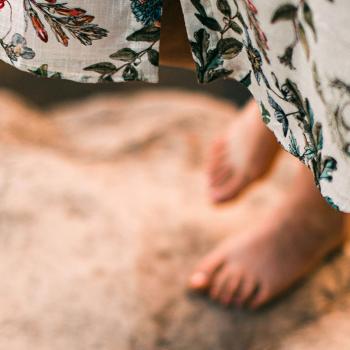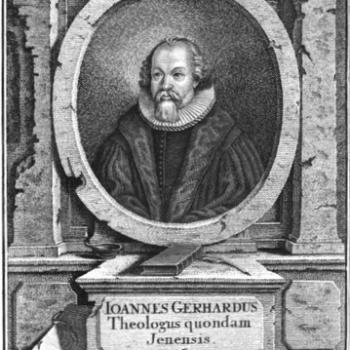Just before Pastor Murray came to BYU, he met with Gordon B. Hinckley. In that meeting, President Hinckley offered him an apology for the LDS Church's participation in slavery and in racism—using the same spirit Pastor Murray had urged me to use when I approached my angry son. In truth, Dr. Murray himself had some cause for anger; he had personally been confronted by the past Mormon teaching that Blacks were cursed. In an email on April 7, 2007, he told me, "In the Air Force I first encountered this teaching when stationed at Thule, Greenland, and lodging with two Mormons. They reminded me of this teaching constantly."
Nonetheless, he held no grudges, and in fact spoke highly of Latter-day Saints. In a talk on September 7, 2011 at USC he said, "The Mormons came when we were giving food [to those in need]. They came in two busloads of workers. They were missionaries, young men to a large extent, and they would help us package the goods, help us serve the goods. We stayed with them for so long."
This scene of Mormon missionaries working hand in hand with other religious groups to serve the needy presents a poignant contrast to the story of Biddy Smith Mason, who was given as a wedding gift to her master; who walked behind the pioneer wagon train shepherding livestock; who had no voice when an auction block seemed her next destiny and her master had announced that his slaves were "well disposed" to go with him to Texas. Blacks were not permitted to speak in open court then (1856), so Judge Benjamin Hayes took the Smith slaves into his chambers and let them speak for themselves. They did, and boldly. Upon hearing their stories, the judge pronounced them "free and free forever."
A little while afterward, Hayes's son ran in front of a buggy. He would have been killed had not one of the newly emancipated Smith slaves leapt to his rescue. Judge Hayes wrote to his friend, "If a judge could be repaid for any duty performed by him—what do you think can be the measure of my reward in such circumstances? If . . . you had a boy—and only one—you would feel as I do . . ."
As Dr. King said in his letter from Birmingham Jail, "We are caught in an inescapable network of mutuality, tied in a single garment of destiny." The person whom we forgive and thus free from a damning trajectory may in turn preserve our own posterity. If we live as a community where we are bound to our relationships more than to our agendas, where we read God's commandments in one another's faces, and then live those commandments through acts of service, we may indeed become one in Christ.
If we Latter-day Saints have not already sought forgiveness for our collective and individual wrongs against people of color, it is time to do so at last—if not as a church than as individuals; if not in words, then in actions. More important than seeking forgiveness for the past, however, is preventing discriminatory ideas from circulating in the future. Certainly, many things led President Hinckley to speak boldly against racism during April Conference, 2006. Perhaps Pastor Murray even had an effect. President Hinckley said: "[N]o man who makes disparaging remarks concerning those of another race can consider himself a true disciple of Christ . . . How can any man holding the Melchizedek Priesthood arrogantly assume that he is eligible for the priesthood whereas another who lives a righteous life but whose skin is of a different color, is ineligible?"
"Disparaging remarks" must include the word "cursed."
Are we concerned that by acknowledging the errors of our past we will decrease members' faith, or will suggest that the course to true peace and unity is not as easily discerned as we might want? The course will constantly be interrupted by the siren calls of tradition. Do we fear that if we disavow teachings of past leaders, we will invite the question, "What else were they wrong about?" If we are governed by the spirit of fear, then we deny the spirit of love and of faith. We deny the transcendent power of grace.
This is the tribute Pastor Murray paid to his fellow pastor, President Gordon B. Hinckley:
President Hinckley is a true messenger of our Lord. Two years ago, I was invited to Salt Lake City by the LDS Church, and President Hinckley took his personal time to sit with our small group that was touring the many ministries and apologized to me in front of the group. That was amazing! Now the [LDS] Church pushes Blacks to learn their lineage via the Church. That will open eyes and doors that will open new avenues of life.

In Nobody Knows: The Untold Story of Black Mormons, Pastor Murray acknowledges, "It is certainly true that the Mormon Church has been a factor in discrimination." He then adds the words he said to President Hinckley after the apology: "But you've done so much good—and now, to hear these words would certainly say that your hearts are right."
(See the long trailer at www.blackmormonfilm.com to hear Dr. Murray's account of President Hinckley's apology. LDS retailers can order the DVD at MormonMedia.com.)




